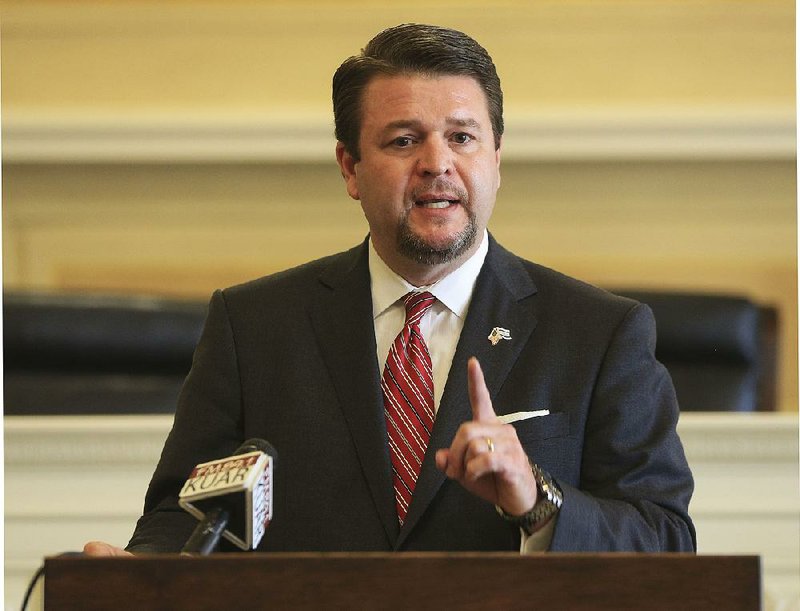A First Amendment showdown between an atheist group and Sen. Jason Rapert, R-Conway, can proceed to trial, a federal judge said Monday.
In an 81-page order, U.S. District Judge Kristine Baker refused to dismiss a Jan. 8 lawsuit alleging that the senator violated the First Amendment rights of atheists who disagreed with him by blocking their comments on his social media accounts. But Baker also denied the atheists' request to impose a preliminary injunction that would force Rapert to immediately unblock his naysayers.
The plaintiffs, led by the national American Atheists group, seized on Baker's finding that the group has a "fair chance of prevailing" in the lawsuit, which Rapert had asked her to dismiss.
"Rapert has repeatedly called our lawsuit against him 'frivolous.' Today's decision should put an end to that ridiculous claim," said Geoffrey Blackwell, the attorney for the atheist group. He added, "The Arkansans Rapert has blocked will get their day in court, and we have every confidence we'll prevail."
But Baker also said the plaintiffs hadn't met the requirements for a preliminary injunction because several of them waited too long to pursue their complaints about being blocked as far back as 2014 and 2015 and because other courts have determined that the appropriate remedy isn't an injunction, "but instead declaratory relief, with the understanding that the judiciary is charged with determining what the law is and all government officials are presumed to follow the law once the judiciary has said what the law is."
While the plaintiffs say Rapert's posts are part of a public forum that they should have access to, Rapert contends the accounts are personal, maintained only by him, and that he is entitled as a private citizen to exercise his own First Amendment rights to shut out those who respond with personal attacks or bullying.
His attorney, Paul Byrd, said he hadn't had time to read the opinion when contacted shortly after it was filed Monday.
While Rapert maintains several Twitter and Facebook accounts, only one account on each social media platform is at issue in the lawsuit -- @JasonRapert on Twitter and the "Sen. Jason Rapert" Facebook page. He says government staff have never managed either, although during campaign season, campaign staff can access and manage his Facebook page.
In addressing Rapert's claims that his social media accounts are private, Baker wrote that "the totality of the circumstances in this case based on the limited record before the court at this stage show that plaintiffs have a fair chance of prevailing on their claim that ... Rapert's accounts rely on 'the power and prestige of ... state office' and were 'created and administered ... to perform actual or apparent duties of [his] office.'"
CLASSIFIED AS 'POLITICIAN'
She noted that he registered his Twitter account as "Sen. Jason Rapert," and in the description section of the account, describes himself as "AR State Senator" and "Founder of National Association of Christian Lawmakers." She notes that his Twitter account includes a link to the state Legislature's official website, and that the account includes a picture of Rapert and a wooden gavel with "Arkansas Senate" written on its side.
Baker also noted that Rapert has tweeted about national and local political issues and used the account to create a public poll asking if his Twitter followers would support a bill removing the names of Bill and Hillary Clinton from the Little Rock airport.
Rapert classified his Facebook page as "Politician," Baker noted. She said it includes a link to his campaign website and includes photographs of him as a state senator. He has also posted alerts about public health and safety issues, such as warnings about a phone scam and an outbreak of hepatitis A in northeast Arkansas, which is outside of his Senate district.
Rapert "has also used his Facebook page to post concerning his work as a state legislator," Baker wrote, citing his discussion of recent bills and political issues under the heading "State Capitol Week in Review." And, she noted, he has used the page to ask constituents in Conway, Faulkner County and Perry County -- his Senate district -- what top three issues they want to be addressed by the Legislature.
"Although State Senator Rapert argues that he uses the social media accounts at issue in this case to post about personal issues and his personal business and ministry, the vast majority of his social media posts ... concern issues that are related to his position as a state senator, including state and local policy issues and updates regarding the Arkansas General Assembly," the judge said.
She said the plaintiffs are also likely to prevail on their argument that Rapert acted under color of state law when he used the Twitter and Facebook accounts in question, as well as on their claim that the accounts are under government ownership or control, because they describe him as a state senator and include pictures from the state Senate, which "show that [he] is holding himself out in his official capacity as a state senator."
Baker also said that Rapert "has used the relevant social media accounts to conduct business related to his office," and has said on social media that "gathering public input ... is part of the job description."
She said the plaintiffs also have a fair chance of prevailing on their argument that Rapert "engaged in viewpoint discrimination when he blocked plaintiffs on Twitter account and Facebook page," noting that the state is forbidden from exercising viewpoint discrimination.
While the plaintiffs have a likelihood of success on their overall free-speech claims, Baker said she won't allow the plaintiffs to pursue monetary damages against Rapert in his personal capacity on those claims. She indicated she hasn't yet decided whether he is entitled to qualified immunity on the plaintiffs' other claims. Qualified immunity shields public officials from civil damages if the conduct doesn't violate clearly established rights.
Metro on 10/01/2019

